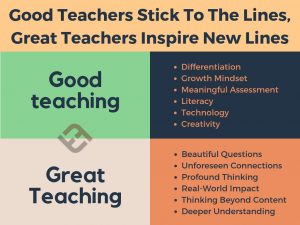The Broad View While Walking Upright
Every one of us takes a road less travelled at some time in our lives. Some of us are comfortable just being on that road almost always and some of us haven’t explored it for some time. Some of us are not afraid to show that courage to step into territory that we have not charted before and we build a process within ourselves to keep testing our limits or our beliefs or both. Others come by the unknown in quieter ways, with caution, sometimes with fear of failure or fear of the unexpected. The energy we expend dealing with this push and pull of “Should I go? How far can I take this? Where will this lead me?” can be immensely exhausting, especially when we look back at our material accomplishments and the responsibilities that have built up with them over time and make us choose a safer road for the sake of others as much as for ourselves.
On our present course, we look to one side and see that so much is changing and wonder if we are falling behind. We look to other side and see how little and how slow humanity is to change, especially in light of humanity’s global impacts. Looking ahead seems both futile and hopeful at the same time, yet it is perhaps when we glimpse the hopefulness inside us that we begin to see a place where our courage can be nourished in the waters of vulnerability, and that the unknown future holds promise if we would only give in to the call for action.
The Path of Teaching: A Personal Context
The road we choose is the one we have always been building for ourselves and to realize this is to carry our own personal context with us into our masters studies in a way that it is worn on our sleeves for all to see. That is an act that requires vulnerability, but it is necessary for the work ahead not only to be successful but, more importantly, to be meaningful. I have come to a place now where I am able to express these ideas because of the time spent with colleagues and the groundwork laid down by professors. As intense and short-lived EDCI 515 and 586 have been, both have managed to break the ground and reveal understandings that have prepared my mind for the “searching again” that lies ahead. Dr. Jennifer Thom and Dr. Valerie Irvine have infused me somehow, perhaps subconsciously, with some essential “fire-starting” qualities: an invitation to self-awareness, a stronger sense of confidence to meet my newly required abilities, a feeling of belonging to a new community of like-minded, a shedding of immature cynicisms about higher education, and a return to the practice of deeply considering what is most important in what we teach.

CC Public Domain from: teachthought.com
I have to admit that I was not as prepared as I had hoped I would be on the first day of classes. A 15-page course outline was a shock. The number of “optional” online forms of collaboration, communication, and sharing had me gasping for air. I was afraid of being completely out of touch with APA, not having written a scholarly piece in… well almost a couple of decades (although I did co-author a submission with video clips for a medical journal on immune cell surveillance, which was never published as far as I knew). I thought I would not know anyone and I was uncertain how much I had earned the privilege to be there. The first time I had the financial means to pursue a masters, my young family fell in need of a car that was reliable and so, the masters was put off until now. The timing could not be better. As the first week ended, I felt sense of place, of knowing that this was going to work out.
I have the impression that research methods (515) was drip-fed on purpose, giving us time to realize just how varied scholarly research in education is. Ideas have been proposed for dwelling on and considering with patience so that the value of personal contexts could filter in and not be compromised. As the readings peeled back the layers of a rich and ever-changing culture of academic study, I began to realize that the philosopher-teacher inside me was being reignited. I will have research and define more clearly autoethnography, phenomenology, narrative inquiry, and I am leaning on the theoretical side of all this.
Exposing the quantitative method reminded me of a philosophical quip from Einstein who, in response an issue raised in the burgeoning field of quantum mechanics and the idea that some actions happen by little more than luck, said, “[God] does not play dice.” This had me reaching into a bookshelf in a closet to pull out an adolescent psychology text to remind myself how cut and dried the attempt was to make teaching something that anyone with the right knowledge could do. Robert Slavin filled the pages with leading education theories and practices that have not changed very much. Many of my colleagues today still cling to ideas like Bloom’s Taxonomy of Educational Objectives, Carroll’s 1963 five elements of effective instruction in his work ‘A Model of School Learning’, and Slavin’s own version of it called QAIT (Slavin, R. 1991. pp 212, 233-234.). Then I stumbled upon a figure adapted from Mager’ 1975 work explaining prerequisite skills and I was shocked. It was the exact same explanation I had witnessed from a professional development webinar by Tom Schimmer earlier this year. Is education like the fashion industry? Is everything old new again? This realization has only hardened my resolve to stir the pot.
Earlier in the school-year, I publicly stated to my staff that I was no longer going to stand as their professional development representative in order to concentrate my efforts on this masters degree. I had been the lone teaching staff member of the committee for 18 years, having planned many pro-d days with the help of my administration and the odd teaching colleague here and there. I knew the ennui that some felt around pro-d, but I always saw value in keeping the conversation going. This masters program is my chance to have deep, meaningful conversation with myself and with the research I have yet to explore.
What is very intriguing to me is the use of online platforms as a means to deliver and exchange ideas about education. It had occurred to me that there was a potential to develop an online learning culture and I had already created Google classrooms for all of my classes and one shared with a few teaching colleagues as a club. EDCI 586 has opened my eyes to a wider potential of online learning and I have already begun to make arrangements with industry professionals to video chat with some of my classes and make learning connections with people instead of YouTube video tutorials. There is new potential also for me to expand my own research capabilities online so that I can continue to grow as a teacher. Before this class, I have been primarily using the internet to gather online resources to enhance the direction that my students were taking my teaching. I see now that all I’ve been doing is mostly increasing the entertainment value of my lessons, but there are many more engaging ways to use online learning like having students use a social platform to share their research with each other, find expertise to take their learning further, learn to evaluate the quality of the online resources that they curate, and make new connections with more focused and in-depth intention.
Moving Forward with Deliberate Intention
As far as developing a research question goes, I have begun to lean in the direction of a personal journey that might end up looking like a flow chart of directions that teaching colleagues or students can use to transcend the barriers that cause conflict with the purpose of their teaching or learning. The question might be something like, “How can I (the teacher/student) reflect and reinstate my purpose and passion for teaching/learning beyond the subjects that I teach/learn?” Sounds a little out there on the edges of the research, but I am very interested in that realm of teaching skills and ways that make colleagues and students say, “I’m really interested in pursuing this further. This really speaks to me thanks to the ways I’ve been introduced to it.” I’d like to push the function of teaching/learning around, revisit the deep questions of identity, context, and value.
The road less travelled for me does not mean that it is necessarily unfamiliar for, as Socrates most famously said, “The unexamined life is not worth living”. I am drawn once again to shed a Taoist light on my teaching and to fall into some research that connects the teachings of Lao Tzu (c.604-531 BC) to the philosophies and practice that can be found in today’s academic research and in my own way of teaching; ‘(a) leader is best when people barely know he exists. Of a good leader, who talks little, when his work is done, his aim fulfilled, they will say, “We did this ourselves.”‘
References
Schimmer, T. (2019.) Assessment & the New BC Curriculum. (Professional Development Webinar. January 17, 2019.)
Slavin, R. E. (1991). Educational Psychology: Theory into Practice. Englewood Cliffs, NJ: Prentice-Hall.
Stephen, A. (2016). This Book Will Make You Think: Philosophical Quotes and What They Mean. London: Michael OMara Books.



Recent Comments